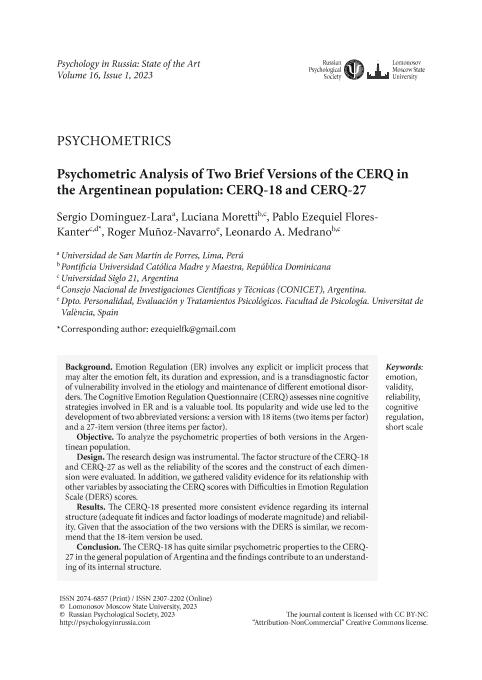Mostrar el registro sencillo del ítem
dc.contributor.author
Dominguez Lara, Sergio
dc.contributor.author
Moretti, Luciana
dc.contributor.author
Flores Kanter, Pablo Ezequiel

dc.contributor.author
Muñoz Navarro, Roger
dc.contributor.author
Leonardo Adrían, Medrano
dc.date.available
2024-01-04T18:43:54Z
dc.date.issued
2023-04
dc.identifier.citation
Dominguez Lara, Sergio; Moretti, Luciana; Flores Kanter, Pablo Ezequiel; Muñoz Navarro, Roger; Leonardo Adrían, Medrano; Psychometric Analysis of Two Brief Versions of the CERQ in the Argentinean population: CERQ-18 and CERQ-27; Russian Psychological Society; Psychology in Russia: State of the Art; 16; 1; 4-2023; 26-43
dc.identifier.uri
http://hdl.handle.net/11336/222467
dc.description.abstract
Background. Emotion Regulation (ER) involves any explicit or implicit process that may alter the emotion felt, its duration and expression, and is a transdiagnostic factor of vulnerability involved in the etiology and maintenance of different emotional disorders. The Cognitive Emotion Regulation Questionnaire (CERQ) assesses nine cognitive strategies involved in ER and is a valuable tool. Its popularity and wide use led to the development of two abbreviated versions: a version with 18 items (two items per factor) and a 27-item version (three items per factor). Objective. To analyze the psychometric properties of both versions in the Argentinean population. Design. The research design was instrumental. The factor structure of the CERQ-18 and CERQ-27 as well as the reliability of the scores and the construct of each dimension were evaluated. In addition, we gathered validity evidence for its relationship with other variables by associating the CERQ scores with Difficulties in Emotion Regulation Scale (DERS) scores. Results. The CERQ-18 presented more consistent evidence regarding its internal structure (adequate fit indices and factor loadings of moderate magnitude) and reliability. Given that the association of the two versions with the DERS is similar, we recommend that the 18-item version be used. Conclusion. The CERQ-18 has quite similar psychometric properties to the CERQ27 in the general population of Argentina and the findings contribute to an understanding of its internal structure.
dc.format
application/pdf
dc.language.iso
eng
dc.publisher
Russian Psychological Society
dc.rights
info:eu-repo/semantics/openAccess
dc.rights.uri
https://creativecommons.org/licenses/by-nc-sa/2.5/ar/
dc.subject
EMOTION
dc.subject
VALIDITY
dc.subject
COGNITIVE REGULATION
dc.subject
SHORT SCALE
dc.subject.classification
Otras Psicología

dc.subject.classification
Psicología

dc.subject.classification
CIENCIAS SOCIALES

dc.title
Psychometric Analysis of Two Brief Versions of the CERQ in the Argentinean population: CERQ-18 and CERQ-27
dc.type
info:eu-repo/semantics/article
dc.type
info:ar-repo/semantics/artículo
dc.type
info:eu-repo/semantics/publishedVersion
dc.date.updated
2024-01-03T12:42:16Z
dc.identifier.eissn
2307-2202
dc.journal.volume
16
dc.journal.number
1
dc.journal.pagination
26-43
dc.journal.pais
Rusia

dc.description.fil
Fil: Dominguez Lara, Sergio. Universidad de San Martín de Porres; Perú
dc.description.fil
Fil: Moretti, Luciana. Pontificia Universidad Católica Madre y Maestra; República Dominicana. Universidad Siglo 21; Argentina
dc.description.fil
Fil: Flores Kanter, Pablo Ezequiel. Consejo Nacional de Investigaciones Científicas y Técnicas; Argentina. Universidad Siglo 21; Argentina
dc.description.fil
Fil: Muñoz Navarro, Roger. Universidad Complutense de Madrid; España
dc.description.fil
Fil: Leonardo Adrían, Medrano. Universidad Siglo 21; Argentina
dc.journal.title
Psychology in Russia: State of the Art
dc.relation.alternativeid
info:eu-repo/semantics/altIdentifier/url/http://psychologyinrussia.com/volumes/?article=10366
dc.relation.alternativeid
info:eu-repo/semantics/altIdentifier/doi/http://dx.doi.org/10.11621/PIR.2023.0102
Archivos asociados
